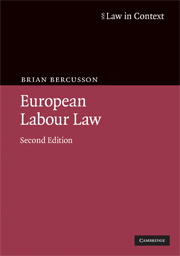Book contents
- Frontmatter
- Contents
- Preface
- Section I Labour law and Europe
- 1 European labour law and the social dimension of the European Union
- 2 EU labour law and the UK
- 3 The conceptualisation of European labour law
- 4 Shifting strategies 1951–1986: ECSC, EEC, harmonisation, financial instruments, qualified majority voting
- 5 The strategy of European social dialogue
- 6 The European Employment Strategy, the open method of coordination and the ‘Lisbon Strategy’
- 7 The strategy of fundamental rights: the EU Charter of Nice 2000 and a ‘constitutional’ strategy
- Section II The structure of European labour law
- Section III The futures of European labour law
- Index
- References
3 - The conceptualisation of European labour law
from Section I - Labour law and Europe
Published online by Cambridge University Press: 05 June 2012
- Frontmatter
- Contents
- Preface
- Section I Labour law and Europe
- 1 European labour law and the social dimension of the European Union
- 2 EU labour law and the UK
- 3 The conceptualisation of European labour law
- 4 Shifting strategies 1951–1986: ECSC, EEC, harmonisation, financial instruments, qualified majority voting
- 5 The strategy of European social dialogue
- 6 The European Employment Strategy, the open method of coordination and the ‘Lisbon Strategy’
- 7 The strategy of fundamental rights: the EU Charter of Nice 2000 and a ‘constitutional’ strategy
- Section II The structure of European labour law
- Section III The futures of European labour law
- Index
- References
Summary
European labour law is an intellectual discipline in the process of being developed by academics (and practitioners and judges) from all over Europe. The intellectual challenge of competing conceptualisations is a hallmark of EC law in general, and EC labour law is no exception. Students of the subject are confronted with very different perspectives on the same legal material – a highly stimulating prospect allowing for debate over the merits of different analytical frameworks. The shape of EC labour law is not determined by those steeped in the British or any other national labour law tradition. Among others, Belgian, Danish, French, German, Italian and Spanish, as well as British labour lawyers are engaged in proposing conceptual frameworks for the EC labour law that applies in their jurisdictions.
The conceptualisation of European labour law is influenced by the symbiosis of national labour law systems and EC labour law, and the interaction of law and context. This can be illustrated by looking at a number of books which have appeared proposing frameworks for EC labour law. Different structures of EC labour and social law emerged depending on the approach adopted. Since all seek to expound the law on the basis of the same legal measures, it is all the more remarkable that the picture of EC labour law emerging from them is so very different. The following examination of competing conceptualisations aims to stimulate thinking about the conceptualisation of European labour law.
- Type
- Chapter
- Information
- European Labour Law , pp. 78 - 98Publisher: Cambridge University PressPrint publication year: 2009



